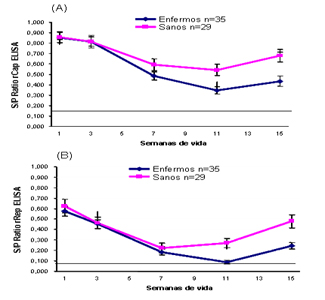New serological techniques for detecting antibodies against porcine circovirus

PCV2 is the etiological agent responsible of several pig diseases; commonly named as porcine circovirus diseases (PCVD), in which postweaning multisystemic wasting syndrome (PMWS) is, from the economic point of view, the most important disease in domestic swine production worldwide.
A routine method to distinguish animals affected by PMWS in live pigs is lacking. PCV2 antibody detection assays developed until today did no result of apparent diagnostic value, since PCV2 is ubiquitous worldwide and the seroconversion pattern is similar in PMWS affected and non-affected farms. However, PCV2 serology has been very useful to monitor the PCV2 infection status on farms and in epidemiological and experimental studies. Different serological tests have been developed to date, although all of them have been based on inactivated whole PCV2 particles or recombinant Cap proteins.
Using insects as live bioreactors is currently the most cost-efficient alternative to produce recombinant proteins by means of baculovirus expression vectors. ALGENEX (Alternative Gene Expression S.L.) is a "spin-off" company of the INIA and has developed improved baculoviruses with enhanced productivity and specifically designed to increase the antigenicity and the immunogenicity of the recombinant proteins expressed (if desired).
The new methods here developed have three main novelties:
1. The use of a relatively new inexpensive strategy to obtain high yields of recombinant proteins in insect-larvae upon infection with the specific recombinant baculoviruses. High yields of recombinant protein, without the need of sterile conditions, fermentors or growth media during production process are some of the advantages of such system.
2. The development of a new ELISA capable to consistently detect antibodies against the PCV2 Replicase proteins (Rep) in PCV2 infected pigs that together with the Cap specific ELISA added new insights into PMWS diagnosis. The results of our work demonstrated the potential of these two ELISAs for large scale serological studies. Moreover, this study also represents the first longitudinal study of the induction of anti-Cap and anti-Rep antibodies in farms affected by PMWS, from one week of age until the occurrence of disease.
3. The potential of the Rep-ELISA to be used as a DIVA-diagnostic method capable to distinguish infected from vaccinated animals.
References
"Development of two Trichoplusia ni larvae-derived ELISAs for the detection of antibodies against replicase and capsid proteins of porcine circovirus type 2 in domestic pigs" (Eva Pérez-Martín, Llorenç Grau-Roma, Jordi M Argilaguet, Miquel Nofrarías, José Angel M Escribano, Silvia Gómez-Sebastián, Joaquim Segalés, Fernando Rodríguez). J Virol Methods. 2008 Dec;154(1-2):167-74.

